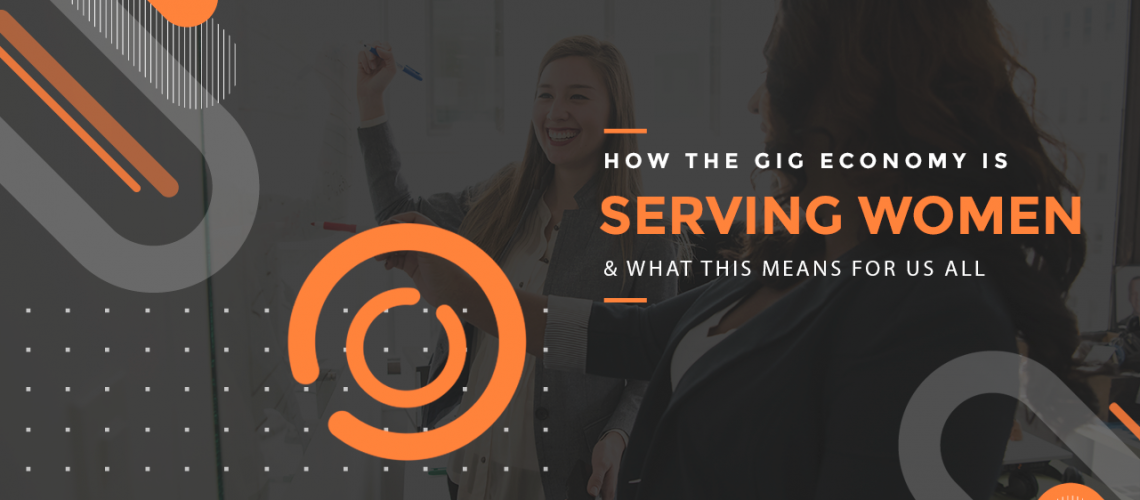
Mehrnaz Karimi
How The Gig Economy Is Serving Women & What This Means For Us All, By Patrick Foster
- April 29, 2019
- , 11:26 am
- , Advice for Contractors
Your stance on the gig economy will depend entirely on your personal and professional circumstances. Some people choose to focus on the negatives — e.g. the lack of job security, and the effect of sites such as Upwork and Fiverr on the perceived value of work — but that’s not the only viable perspective.
Indeed, plenty of people see the gig economy as a good thing: existing freelancers, for instance. With the tech industry being largely dominated by men, the number of females joining the tech force is increasing. The same can be said for the gig economy. But how is the gig economy serving women in particular? Looking at the wider picture of employment, what significance does the answer hold to the workforce in general? Let’s answer these questions:
The rise of flexible and remote working
There was a time when holding a position in a white-collar industry meant adhering to a 9-to-5 routine under glaring fluorescent tubes in an open-plan office. This wasn’t ideal for anyone, but few businesses were willing to buck the trend, and there weren’t any practical alternatives to the office arrangement. You needed the team together, in order to get things done.
Fast forward to the modern internet-connected world, and you see something of a revolution regarding working patterns. The gig economy has pushed flexible working (choosing your hours, either significantly or completely) and remote working as a consequence: when your team members aren’t working the same hours, and can work from laptops, then you don’t really need them in the same location. Team communication tools such as Slack, make instance communication possible.
Remote working has made uncomfortable office environments comfortable once more, for men and women, by allowing them to work in a space that best suits them. For women, uncomfortable office environments can be as a result of a number of factors, including sexual harassment, unequal pay, sexism and so on.
Self-employment and entrepreneurial opportunities
The changes of the gig economy haven’t only affected conventional part-time or full-time employment — they’ve expanded the opportunities available to those who don’t want to be limited by full-time employment. Freelancers in particular are taking advantage of technology, be that by promoting themselves, pitching to prospective clients, or fulfilling their duties from anywhere.
Consider the case of Camille Newman, an entrepreneur who tested the waters with a pop-up fashion business before moving her operation online (read about her female entrepreneur success story here).
In essence, this all adds up to a simple truth: if you’re trying to get ahead without needing to rely on the support or goodwill of others, you have plenty of avenues available to you. Consequently, women who’ve previously felt excluded and alienated can truly make their own future — a study in early 2019 found that 72% of self-employed women feel that they’re in their dream jobs.
How sporadic workloads suit many women
If a skilled professional in the early stages of a regular full-time career decides to start a family, she’ll likely get mandated support, but missing working time might negatively affect her prospects.
With a flexible working schedule, it’s possible to balance pregnancy, and birth and child-rearing with career demands — what ultimately matters is that you get the job done to a high level of quality, and if that happens, then how and when it happens won’t matter as much. Tara Gentile, for example, started a website and purchased a blog six months after giving birth, and was quickly making more money than she’d been making before.
The broader impact on the employment world
The gig economy has made it possible for any woman who wants to start her own business to pursue her dream without external investment or support. It has given a significant boost to flexible and remote working, which is good for women who prefer to stay out of conventional offices (as well as those who want to balance other parts of their lives with their careers).
This, as you’d expect, is affecting the employment world in general to a major extent. Today’s employers are having to adjust their requirements and procedures to become more appealing to workers (both women and men) who’ve become accustomed to more flexible and supportive working arrangements.
With women finding it easier and more rewarding to go into business for themselves, we’re seeing the knock-on effects ripple throughout the business world. Companies are becoming more empathetic, community-driven, and committed to diversity — and performing better while doing so.
Whatever your thoughts, the gig economy is pushing things in a good direction for women in the workplace. It embraces versatility, flexibility, and self-direction. Today, any woman who wants to become a success in the business world can achieve her dreams without support from anyone.
Have you considered working as an IT contractor? Visit https://clearhub.tech/find-it-contractor-jobs/.



